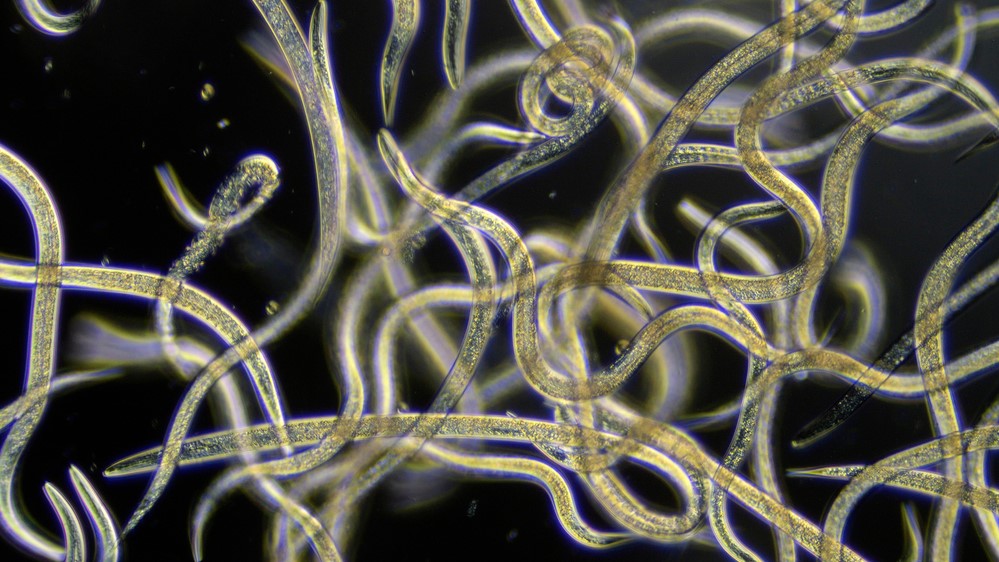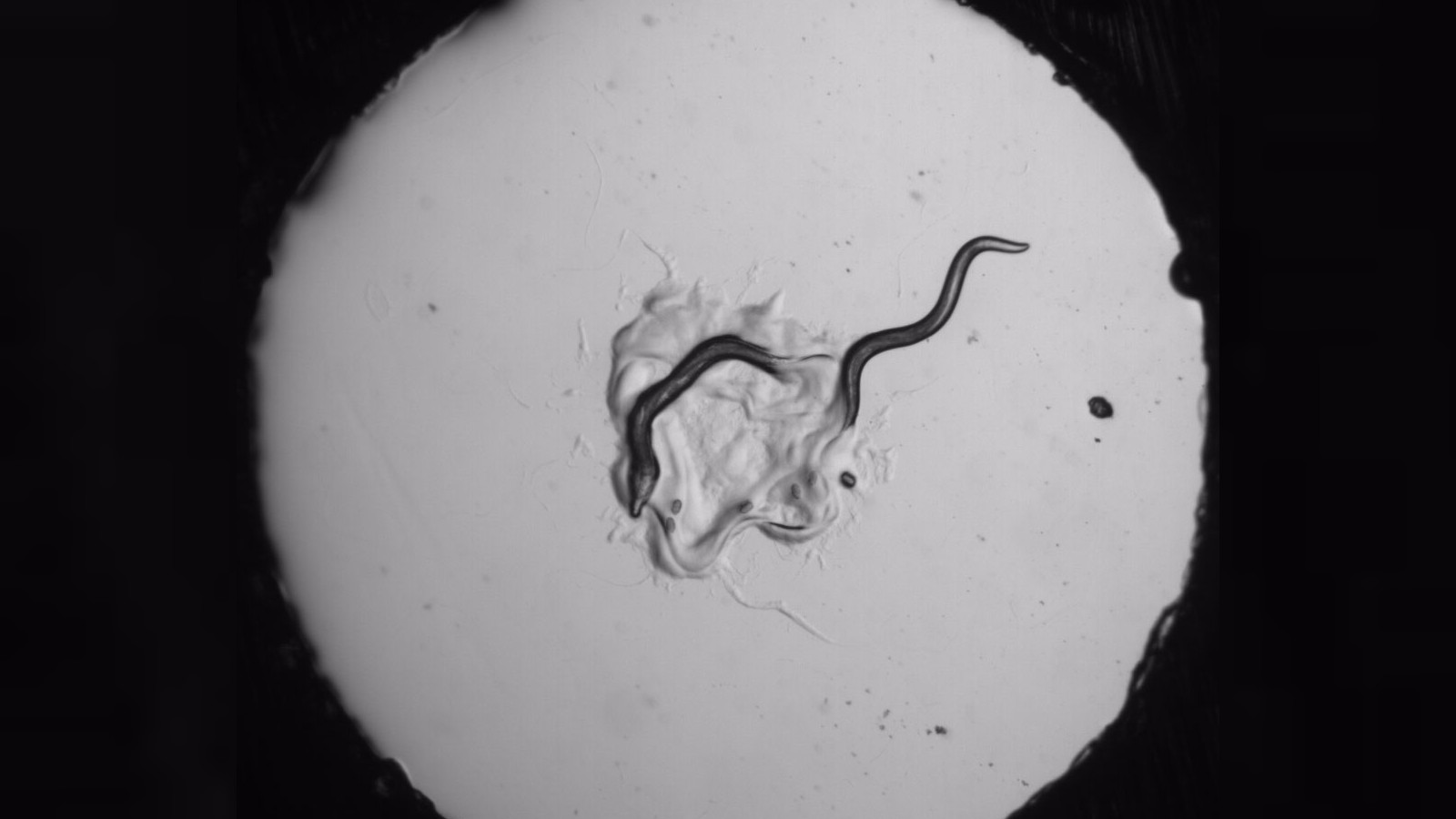These 1-millimeter-long worms can make complex decisions with a mere 300 neurons
The worms have around 285 million times fewer nerve cells than humans.
Get the world’s most fascinating discoveries delivered straight to your inbox.
You are now subscribed
Your newsletter sign-up was successful
Want to add more newsletters?

Delivered Daily
Daily Newsletter
Sign up for the latest discoveries, groundbreaking research and fascinating breakthroughs that impact you and the wider world direct to your inbox.

Once a week
Life's Little Mysteries
Feed your curiosity with an exclusive mystery every week, solved with science and delivered direct to your inbox before it's seen anywhere else.

Once a week
How It Works
Sign up to our free science & technology newsletter for your weekly fix of fascinating articles, quick quizzes, amazing images, and more

Delivered daily
Space.com Newsletter
Breaking space news, the latest updates on rocket launches, skywatching events and more!

Once a month
Watch This Space
Sign up to our monthly entertainment newsletter to keep up with all our coverage of the latest sci-fi and space movies, tv shows, games and books.

Once a week
Night Sky This Week
Discover this week's must-see night sky events, moon phases, and stunning astrophotos. Sign up for our skywatching newsletter and explore the universe with us!
Join the club
Get full access to premium articles, exclusive features and a growing list of member rewards.
A tiny worm with just 300 brain cells has shocked scientists with its ability to make complex decisions. These invertebrate Einsteins display a range of different "smart" behaviors that vary with the situation, despite having sparse neuron power: Their noggins are equipped with around 285 million times fewer neurons than humans, who have around 86 billion of these nerve cells.
Researchers found evidence of this complex decision-making process in the behavior of the predatory species Pristionchus pacificus, which can either prey upon or compete with the worm Caenorhabditis elegans for food. Both species, which grow to be around 1 millimeter in length, prefer to feed on bacteria; however, P. pacificus can also switch to eating C. elegans if bacteria are scarce. The team found that P. pacificus will often bite C. elegans when the two species clash over bacteria, but those bites can be used to either kill or warn-off their competitors.
When P. pacificus came across a C. elegans larvae in the lab, they bit and killed the juvenile nematodes before eating them; however, when the predatory worm went up against fully grown C. elegans, they used non-lethal bites meant to act as a territorial warning that caused C. elegans adults to move away from the bacteria. P. pacificus are perfectly capable of killing an adult C. elegans worm, but such fights likely require more energy and potentially risk injury. Therefore, researchers believe that P. pacificus worms are choosing whether or not to kill their competitors based on the size and life stage of the C. elegans.
"Scientists have always assumed that worms were simple," and as a result, the teams assumed that the bites from P. pacificus only had one purpose, lead author Kathleen Quach, a neurobiologist at the Salk Institute for Biological Studies in La Jolla, California, said in a statement. "Actually, P. pacificus is versatile and can use the same action (biting C. elegans) to achieve different long-term goals."
Related: The 12 weirdest animal discoveries
During the experiments, P. pacificus was also more likely to bite C. elegans when there were fewer bacteria around, regardless of their life stage, suggesting that the nematodes can factor in multiple types of information when making decisions. For a worm with only 300 neurons, this level of decision making is very surprising to researchers. The ability to weigh the costs and benefits of an action with multiple potential outcomes is seen often in vertebrates, but previously scientists thought invertebrates lacked this ability, according to the statement.
The researchers don't know exactly how P. pacificus makes such complicated decisions with so few neurons. However, when the team inhibited the worm's ability to produce dopamine, a chemical known as a neurotransmitter that is used to fire nerve cells in a majority of animals, it caused the worms to target adult C. elegans worms with territorial bites. The researchers also inhibited the worm's ability to produce octopamine, a neurotransmitter exclusively found in invertebrates, which caused the worms to focus less on adult C. elegans worms and target larvae instead. It is, therefore, likely that these two neurotransmitters play a key role in the decision-making, the researchers wrote in the paper.
Get the world’s most fascinating discoveries delivered straight to your inbox.
In future research, the team plans to test the decision-making process of P. pacificus in different scenarios, and to learn more about the role of neurotransmitters in that process. The new research could provide insight into how decision-making might have evolved from simple microscopic organisms to larger animals like humans, the researchers wrote in the paper.
"Even simple systems like worms have different strategies, and they can choose between those strategies, deciding which one works well for them in a given situation," co-author Sreekanth Chalasani, also a neurobiologist at the Salk Institute for Biological Studies, said in the statement. "That provides a framework for understanding how these decisions are made in more complex systems, such as humans."
The findings also have potential implications for artificial intelligence (AI), because understanding how worms make complex decisions with so few neurons could lead to AI algorithms that work with the fewest possible connections, which would greatly increase their efficiency, Science Alert reported.
The study was published online March 7 in the journal Current Biology.
Originally published on Live Science.

Harry is a U.K.-based senior staff writer at Live Science. He studied marine biology at the University of Exeter before training to become a journalist. He covers a wide range of topics including space exploration, planetary science, space weather, climate change, animal behavior and paleontology. His recent work on the solar maximum won "best space submission" at the 2024 Aerospace Media Awards and was shortlisted in the "top scoop" category at the NCTJ Awards for Excellence in 2023. He also writes Live Science's weekly Earth from space series.
 Live Science Plus
Live Science Plus












